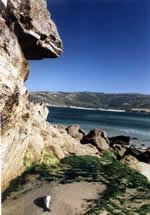 Fishing in Galicia was Belén’s notion of my ideal blind date. “You’re perfect for each other,” she told him during a long distance phone call, while I stood by daydreaming about my first trip to Spain. Standing next to Belén in her tiny Miami Beach apartment during a particularly muggy summer, the thought of north Atlantic winds buffeting my cheeks and a fishing rod in my hands put a smile on my face. I tilted my head to better hear what Juan Manuel blurted through the receiver: “A woman who likes to fish? That’s not possible! Pack her up and send her over! I don’t believe she can catch a damn thing!”
Fishing in Galicia was Belén’s notion of my ideal blind date. “You’re perfect for each other,” she told him during a long distance phone call, while I stood by daydreaming about my first trip to Spain. Standing next to Belén in her tiny Miami Beach apartment during a particularly muggy summer, the thought of north Atlantic winds buffeting my cheeks and a fishing rod in my hands put a smile on my face. I tilted my head to better hear what Juan Manuel blurted through the receiver: “A woman who likes to fish? That’s not possible! Pack her up and send her over! I don’t believe she can catch a damn thing!”The air conditioning unit drowned his voice and perhaps I misheard the “don’t believe” of “catch” and misconstrued the “pack her up” of “fish.” Great, I thought. This would-be love of my life thinks I’m a salted cod, ready for export!
Juan Manuel and I spent a couple of months engaged in electronic correspondence, exchanging occasional letters about fishing, photographs of our most memorable catches and glimpses into each other’s personalities. He promised that during my visit in September he would take me to Galicia, where he was born, to fish for sea bass. Belén had cautioned me, gallegos like Juan Manuel are quiet, reserved and rugged in character, not exactly adept at the art of seduction. Indeed, Juan Manuel did not woo me with romantic lyrics, but lured me with hastily drafted notes about lines and hooks as well as pedantic descriptions of the fish known as lubina in Spain: “The romans knew her as lupus because of her voracity and the greeks as labrax. That’s why her scientific name is lupus labrax. The lubina indubitably reigns the sea and that’s why the English call her THE VERY FISH.”
The fact that the voracious European sea bass was known as “wolf” in Latin and was a feminine noun in Spanish only increased my resolve to prove that a woman could not only catch a fish, but also soften a man’s heart.
I tried not to lose sight of my original objective for this trip. My grandparents and great grandparents were born in Spain but emigrated to Cuba in the early twentieth century. One of my great grandfathers was from Galicia, an inventor who eventually settled in Mexico. I simply wanted to set foot on the motherland, to become familiar with the geography of my bloodlines. But now my trip had transformed, in part, into a sporting challenge. Was I THE VERY WOMAN? Would I “catch” the wily lubina? Would I “catch” the heart of this legendary macho Iberico?
My itinerary for Spain was rather slack. I planned to stay a week or so in Madrid with Belén and her family. If Juan Manuel and I could tolerate each other’s company, I would go to Galicia. In September, Belén and I departed for Madrid on the same day, but on different flights, so Juan Manuel offered to greet me at the airport and to spend the day with me until evening, while we waited for Belén to arrive. My blind date’s first impression of me must have been most conventional, not at all like some fish in a cargo crate, but as a tired coach passenger just arriving off flight 68 in Barajas, lugging a heavy bag. Belén hadn’t warned me about those deep, honey-colored eyes, which were not dripping with sweetness, but heavy with the weight of some sadness.
Our initial meetings were not unlike the challenges of fishing: one fool at one end of the line waiting for another fool at the other end of the line. My challenge was complicated because this gallant Spaniard, while a little rough around the edges, was generous. With straightforward hospitality he refused to let me carry any of my luggage or pay for even a beer; yet he couldn’t help lording his mastery of line and tackle over me: “I won’t believe it until I see you catch that fish.” Juan Manuel had a way of averting his gaze that punctuated a conversation with a final and absolute “period,” followed by a silence that lasted for as long as he dragged on a cigarette. His silence was charged like a cloud ready to thunder and would have intimidated most women, but not me. I couldn’t refuse this challenge and so I formally accepted his invitation to Galicia.
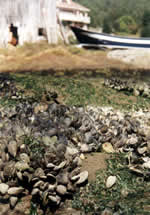 I would unnerve him slowly, steadily. In the car on the way to Galicia, during many of these silent moments, I would smile as the landscape transformed before my eyes -- from the broad, yellow expanse of Castilla-León, a plateau covered with endless fields of dried hay and sunflowers -- to the rising mountain passes that lead to Galicia’s green, sloping hills. Occasionally, we passed pilgrims on the Camino de Santiago, walking canes in their hands and backpacks on their backs. Lost in reverie before the sheer beauty of northwest Spain, I often felt compelled to record my first impressions of this landscape in my journal, and, invariably, after a few minutes, Juan Manuel would laugh, take one hand off the steering wheel and reach over to me, closing the cover of my book with a teasing but firm pat. He would say: “You’re so unusual for a woman. You think. You write.”
I would unnerve him slowly, steadily. In the car on the way to Galicia, during many of these silent moments, I would smile as the landscape transformed before my eyes -- from the broad, yellow expanse of Castilla-León, a plateau covered with endless fields of dried hay and sunflowers -- to the rising mountain passes that lead to Galicia’s green, sloping hills. Occasionally, we passed pilgrims on the Camino de Santiago, walking canes in their hands and backpacks on their backs. Lost in reverie before the sheer beauty of northwest Spain, I often felt compelled to record my first impressions of this landscape in my journal, and, invariably, after a few minutes, Juan Manuel would laugh, take one hand off the steering wheel and reach over to me, closing the cover of my book with a teasing but firm pat. He would say: “You’re so unusual for a woman. You think. You write.”This was no longer about fishing. This was a battle of the sexes, of a Spaniard’s masculine pride versus an American woman’s pluck. Even though my bloodlines were Spanish, I inwardly scoffed his old-fashioned, old-world machismo. His heart was hard, uncertain, faced with a different challenge: he couldn’t catch me.
 Juan Manuel was a well-heeled engineer living in Madrid, but his birthplace was Canduas, a tiny coastal village in the county of Cabana de Bergantiños. Canduas is near the tranquil, marshy cove of A Ensanada, facing the long, winding ría where the fresh waters of the river Anllons mix with the turbulent Atlantic. To the south, the rocky and unforgiving Costa da Morte harbors countless wrecks. The Romans had named this region finisterrae, thinking they had reached land’s end.
Juan Manuel was a well-heeled engineer living in Madrid, but his birthplace was Canduas, a tiny coastal village in the county of Cabana de Bergantiños. Canduas is near the tranquil, marshy cove of A Ensanada, facing the long, winding ría where the fresh waters of the river Anllons mix with the turbulent Atlantic. To the south, the rocky and unforgiving Costa da Morte harbors countless wrecks. The Romans had named this region finisterrae, thinking they had reached land’s end.Juan Manuel was known as the second best fisherman in Cabana; his father was the first. As a child, my fishing guide had learned everything about the sport from this local legend. His relationship to the ría was intimate, as if he had been raised on seawater instead of mother’s milk. In Cabana, he was living, breathing, eating the sea; the sea was coursing through his blood.
The sea was coursing through my blood too, but I was born in the tropics. Unlike Juan Manuel, I was accustomed to the more delicate art of casting for bonefish or tarpon in the shallow waters of Florida’s bays, waters so tranquil and warm, you could wade for your prey in knee-deep, clear water. I had cast gingerly for snook off the bow of a flatsboat, winding lazily through the endless maze of mangroves in the Everglades. The fish still fought fiercely, to be sure, but the art was subtle and the inshore bodies of water flowed gently. The northern Atlantic, by comparison, was untamable and fierce. I had fished once for striped bass off the windward side of Martha’s Vineyard, with heavy, tall rods and live eels for bait. My only acquaintance with fishing in these latitudes had been a true test of my stomach and sea legs. Now fishing was testing my heart.
My father had also taught me about fishing, but the line and reel were eventually replaced by piano and ballet lessons. As an adult, I rediscovered my passion for the sport thanks to a relationship with a transplanted New Yorker. After my relationship ended, I stopped fishing. He kept the boat and the fishing gear; I kept the furniture. I met a couple of men who fished, but they never wanted to share their outings with a woman. For them, fishing was a way to bond with other men. The logistics of fishing alone without companion or a boat defeated me, and before I knew it, three years had passed and I was still taking ballet lessons, but no longer fishing. I missed the sea.
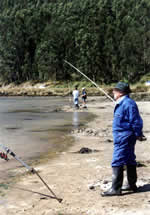 Once in Galicia, I was in Juan Manuel’s territory. To the west, the seemingly endless Atlantic, and to the east, fertile farmland, covered with pine and eucalyptus trees that swirled in the constant flush of wind from the sea. Further up the hills surrounding Cabana, ruins of pre-Christian settlements dotted the forests. Here my imagination went wild. Surely the witches of Celtic folklore roamed about these pastoral hills; somewhere a beneficent meiga was casting spells.
Once in Galicia, I was in Juan Manuel’s territory. To the west, the seemingly endless Atlantic, and to the east, fertile farmland, covered with pine and eucalyptus trees that swirled in the constant flush of wind from the sea. Further up the hills surrounding Cabana, ruins of pre-Christian settlements dotted the forests. Here my imagination went wild. Surely the witches of Celtic folklore roamed about these pastoral hills; somewhere a beneficent meiga was casting spells.When we arrived in Canduas, I saw an old man sitting by himself on a chair on the sidewalk, holding a cane. He squinted in the bright sun, which was making a welcome appearance in September, a usually rainy month. Through tiny slits, he peered into the sky as if his gaze were seeking the light, not avoiding it. His cloudy pupils seemed fixed, staring blankly at the sky. The smile on his face was cheerful, acknowledging me with child-like innocence. For as long as I could witness, the expression on that face never wavered. I knew that in the gleaming sunlight, some old man smiled and I was, however briefly, a blurry silhouette in his vision.
After settling in, Juan Manuel showed me the family garden. Almond, pear, peach and apple trees grew down the slight slope that caressed the strand where the ría met the land. Closer to the kitchen, rows of tomatoes, cabbage, beans and other legumes and vegetables thrived. In the kitchen, a livewell held bogavantes, lobsters as large as my torso, their enormous claws taped shut.
I noticed a small, wooden boat lying abandoned in the family orchard, as if a storm surge had once pushed it beyond the reach of the shore. The grass grew tall through its bleached, splintered planks. How odd, I thought. Juan Manuel loved repairing old boats. Why would he let this one deteriorate? “Oh, that’s just an old boat,” he said. “Been in the family for years.”
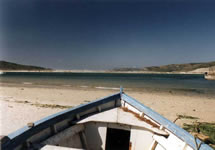 “Speaking of boats,” he continued, “I’ve got to check the motor. Change into some sweatpants and meet me at the beach.” When I arrived at the beach, Juan Manuel was waist-deep in the water, dragging the boat behind him toward the shore with the anchor line. In the distance, little white crests danced haphazardly in the wind. Fine sand blew into my face and pricked my skin. I took off my shoes, rolled up my sweatpants and stepped into the foam. “Wait!” he hollered while I felt the blood vessels in my legs shriveling in the frigid water.
“Speaking of boats,” he continued, “I’ve got to check the motor. Change into some sweatpants and meet me at the beach.” When I arrived at the beach, Juan Manuel was waist-deep in the water, dragging the boat behind him toward the shore with the anchor line. In the distance, little white crests danced haphazardly in the wind. Fine sand blew into my face and pricked my skin. I took off my shoes, rolled up my sweatpants and stepped into the foam. “Wait!” he hollered while I felt the blood vessels in my legs shriveling in the frigid water.The outboard motor was gasping and spewing fumes. “I think we’re going to have to dry dock the boat,” he explained. While helping me in, he told me that he had ordered a part for the engine several weeks before and that with true Galician timing, the part had not arrived. Without that part, the outboard motor worked unpredictably. He noticed the disappointment on my face. “Don’t worry,” he reassured me. He had to dry dock the boat for the winter season anyway. Tomorrow we could cast from shore instead of trolling. “Conditions aren’t right for trolling anyway,” he admitted. “The lubina won’t bite.”
He sat aft and grabbed the rudder, guiding the 16-foot long wooden boat toward the dancing crests. “We don’t have far to go,” he said. The motor churned steadily with an occasional hacking cough, struggling against a strong current. As we rounded the shoreline, the wind shifted against us, forcefully pushing the bow. Gradually the beach transformed into a rocky elevation where the wind had carved the earth. We drifted between rocks and a sandbank, tossed in every direction by the waves, the boat keeling clumsily from port to starboard at the whim of some invisible mechanics. The Atlantic tide was sweeping in too rapidly around the sandbank to subside, and as it gathered energy, the water roiled.
I remembered a road sign I had seen at the entrance of Canduas that announced a place called A Revoltas – revolt, agitation, restlessness. I sat quietly while my heart stood still, hardly comforted by that memory. I gripped the side planks of the boat tightly. If the boat tipped, I would not have the strength to swim through this pass. The waves would engulf me.
Suddenly Juan Manuel put his hand on my shoulder. “Move. Motor’s dead.” I leaned to one side so he could step to the bow, where he grabbed two oars. I watched him row hastily toward the coastline, but the boat seemed to stand still. He looked glassy-eyed, determined to reach terra firma. I simply held my breath.
We reached the boat ramp where a friend of his had already backed a trailer into the water. “You’re strong, Juan Manuel,” I said as he took my hand and I stepped out of the boat. “I’m not what I used to be, Maria, not what I used to be,” he replied, disavowing the present, leaving me removed from his past.
Later that evening Juan Manuel insisted I sample percebes. He pointed out wooden crosses along the curb where percebeiros had perished on the cliffs below, engaged in the highly dangerous occupation of handpicking edible goose barnacles off of rocks that are partly exposed during the ebbing of crashing waves. At the restaurant Juan Manuel asked the owner to bring him a handful of the day’s catch. After a few, studious sniffs, his brows knotted in disapproval.
We continued driving south to Laxe, where we stopped for a moment at the jetty to observe the locals who were braving the brisk evening air to fish for squid. Then we walked toward a restaurant where Juan Manual assured me the catch would be extremely fresh. The restaurant was tiny, crowded and warm with boisterous conversations in gallego. We shared a platter of steamed percebes and washed it down with a bottle of alvarinho. I ate them with my hands, pulling out their smoky, rubbery flesh from the hard shell casing. As ugly as they were, their taste of the sea was so strong, headier than the golden wine. I wondered if a perceibero had lost his life to the merciless waves so that I could enjoy this delicacy.
Later at the house I opened a window to hear the sound of the ría in the distance. The waves seemed less menacing from afar. I expanded my lungs to receive the intoxicating, medicinal air. “It’s cold,” he said as he gently shut the window.
We made love for the first and only time. My mouth had kissed the sea and I was drunk with its revelation: this was no longer about fishing. A meiga had a cast a spell.
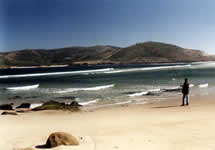 The next morning we hardly spoke, except for some humorous remarks about the fact that we had not done any fishing and that we had finally arrived at the much-anticipated day. Juan Manuel stopped to buy some thread and frozen bait at a small shop before we headed to what he called his private fishing spot. The morning mist was receding as we turned onto a dirt road that wound through a forest of pine and eucalyptus, its ground densely covered with ferns. At the bottom of the cliff we stopped and I asked if this place had a name. “No name. Come on.”
The next morning we hardly spoke, except for some humorous remarks about the fact that we had not done any fishing and that we had finally arrived at the much-anticipated day. Juan Manuel stopped to buy some thread and frozen bait at a small shop before we headed to what he called his private fishing spot. The morning mist was receding as we turned onto a dirt road that wound through a forest of pine and eucalyptus, its ground densely covered with ferns. At the bottom of the cliff we stopped and I asked if this place had a name. “No name. Come on.”With two long shore-casting rods and a tackle box in tow, he walked ahead of me toward the west end of the beach, where he climbed onto some rocks and walked lithely above them with great confidence, as if barefoot on a soft carpet. I stopped in my tracks. The rocks were half my height and covered, at low tide, with thousands of mollusks, their pearly, fuchsia-colored shells gleaming in the morning sun. Silky green sea grasses were still moist from the receding waters, covering the rocks like extravagant hair. I climbed onto the first rock. Juan Manuel was nowhere in sight.
I took a deep breath and proceeded carefully after stuffing my camera into the oversized jacket Juan Manuel let me borrow. I inched my way slowly toward the water, crawling like a baby when the grass was too slippery or treading like a tightrope walker when the shells were razor-sharp. Little pockets of water swirled beneath me between gaps in the rocks, which I had to negotiate with the legs of a petite woman. After a few minutes I noticed Juan Manuel below, preparing the leaders.
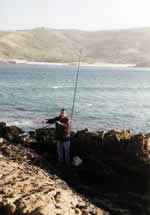 “Where the hell were you?” he asked flatly when I finally reached him. “Here, hold this thread.” I watched him wrap the bit of thread he had broken off the bobbin around a piece of white navaja flesh, turning it into a little ball at the curve of the hook. “This will keep the bait from falling apart in the water.” His movements were precise and unconscious, just as he had moved when he walked on the rocks. I wondered if by “private fishing spot” he meant that it was interior, tucked away in the seclusion of his past, when he learned to walk over these rocks with the help of his father’s hand, or when, as a young adult, he would leave some sleepy lover in bed while he spent long, lonely mornings fishing alone.
“Where the hell were you?” he asked flatly when I finally reached him. “Here, hold this thread.” I watched him wrap the bit of thread he had broken off the bobbin around a piece of white navaja flesh, turning it into a little ball at the curve of the hook. “This will keep the bait from falling apart in the water.” His movements were precise and unconscious, just as he had moved when he walked on the rocks. I wondered if by “private fishing spot” he meant that it was interior, tucked away in the seclusion of his past, when he learned to walk over these rocks with the help of his father’s hand, or when, as a young adult, he would leave some sleepy lover in bed while he spent long, lonely mornings fishing alone.Feeling totally useless, I pressed two fingers on the metal leader at the end of the line, which was swaying side to side from the weight of the sinker, so he could wrap the bait with greater ease. “In Florida I always press down the barb on the hook,” I remarked “so as not to hurt the fish if I release it.” He didn’t miss a beat. “That kind of foolishness won’t work here, Maria.”
“Ok we’re done. Stand here. Let me cast for you.” He stretched the rod back, handing it to me once the sinker dunked into the water. To prevent our lines from tangling, he stepped a few feet away to cast at a safe distance from me. Once both lines were in the water we were finally fishing. Patience settled in.
My rod was very top-heavy and much taller than me. I knew that if I had tried to cast the rod, the line would have landed too close to shore and I probably would have slipped clumsily into the water along with the bait. I sighed quietly and just resigned myself to the “foolishness” of the only fishing I had known, which felt relatively dainty, feminine and completely out of place in these surroundings, completely unknown to this rugged stranger standing nearby who was undoubtedly physically stronger than me, but incapable, I admitted to myself, of acknowledging any of my own strengths. Belén had been wrong. We were not perfect for each other.
As the minutes passed, so did my frustration. The beauty of the ría melted my resentment and my grip on the reel softened. In the pensive yet nervous moments before the anticipated strike, I let the sound of the waves lull me into a reverie and I forgot about Juan Manuel. Each of us loved this moment intensely, but not because we were fishing together. Fishing is a solitary activity. You, the line, the sea and the creature whose life you are about to sacrifice. I was alone in this sacred relationship between woman and beast, woman and the sea.
Suddenly the tip of the rod bent and I wound the reel back to set the hook. The line squealed and my heart raced as I tried to follow and resist the frantic movement of the fish in the foam. I remembered one of Juan Manuel’s letters, in which he described the gritty, toothless mouth of the lubina, which could easily sheer the monofilament. Before I knew it, Juan Manuel yanked the rod out of my hands. I looked at him incredulously. “What are you doing?” I demanded. “Hold on, hold on,” he answered and started to reel the fish in toward the rocks.
After a minute or so, he handed the rod back to me. “All right, hold it tight and follow me.” Without losing the fish, I had to manage the slippery sea grasses as well as the shells that cracked under my feet. If the fish fought too far from land, it would be more difficult to tame its energy; if it fought too close to the rocks, the line might snap. When I had finally subdued the fish, we were still far from the sandy beach where it would have been easier to land. Juan Manuel squatted at the edge of one of the rocks and pulled a 2-foot lubina out of the water.
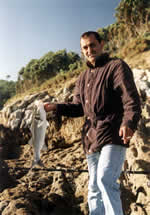 I swallowed my pride as quickly as it had swallowed the bait. Juan Manuel and I caught the lubina together.
I swallowed my pride as quickly as it had swallowed the bait. Juan Manuel and I caught the lubina together.Later that evening, Juan Manuel took me to watch the sunset at Montebranco, a bird sanctuary just north of Cabana. We sat next to each other on an enormous boulder that was shaped like an armchair at the top of the cliff.
The Atlantic stretched taut to the west, as if a blanket lying softly against some mythical, breathing giant about to yawn. To the east, the winding ría found its way to the tranquil marsh that Cabana’s people called their backyard, the resting place for the toes and fingers of the sea. The tides were shifting in the distance below, the ever-moving waters of the ría exposing the temporary canvases of the sandbank called A Barra. A few horses galloped on the bank’s shore, their riders taunting not only the come and go of the sea’s fickle tides, but the unequivocal beat and pace of nature.
Tomorrow we would return to Madrid. Juan Manuel lit a cigarette and after a few long, thoughtful drags broke his silence unexpectedly. “Maria,” he said softly, “did I tell you my father suffered a stroke? He’s paralyzed, dumb.”
“No, Juan Manuel, I didn’t know,” I managed to respond, not knowing what to say. He continued smoking, as if conversing with the embers at the end of his cigarette.
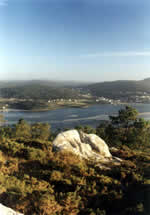 And at dusk, sitting quietly at land’s end, I realized that it was my heart that needed to soften, not his. Part of Juan Manuel was dying. The old man I had seen in Canduas was Juan Manuel’s father. He had once rowed the abandoned boat I had inquired about in the family orchard. He had battled the roiling waves of A Revoltas. A little moment of history from this place was coming to an end, which I witnessed, just before it would disappear into the dark eternal night, just before it would vanish into that vast blue ether of sea and sky.
And at dusk, sitting quietly at land’s end, I realized that it was my heart that needed to soften, not his. Part of Juan Manuel was dying. The old man I had seen in Canduas was Juan Manuel’s father. He had once rowed the abandoned boat I had inquired about in the family orchard. He had battled the roiling waves of A Revoltas. A little moment of history from this place was coming to an end, which I witnessed, just before it would disappear into the dark eternal night, just before it would vanish into that vast blue ether of sea and sky.The setting sun reflected its warm, amber light into Juan Manuel’s cold, distant gaze. I finally understood the sadness he so carefully shielded behind those brown eyes, just as I had first seen it in Madrid. He carried the fading light of this place within him.
Night was falling, but love wasn’t. The sea was breathing at its usual pace. The sea would never die. But with each exhale of the sea and every inhalation of my lungs, love was also disappearing into the night, fading softly into the memory of this encounter.
I knew then I didn’t love him, but loved him for what he taught me. My acquaintance with Spain had become as rich as this sea and this land, which for the first time, was no longer a stranger to me. I finally felt this sea and this land coursing in my blood. I had fallen in love with Spain and I would never be the same, because of him, because of Galicia.
Author’s note: These events took place in September 2001. As I was finishing my first full draft of this narrative in the fall of 2002, the oil tanker Prestige spilled thousands of tons of oil just west of Galicia, forever changing the landscape I have just described. As a writer, I am perplexed by the irony of the oil spill occurring just as I was trying to tell this tale, preserving my memories of Galicia and Juan Manuel in writing. It became difficult to edit this story as I saw photographs of birds covered in oil and read reports of devastated ecosystems and economies. Had I been writing a memorial before an unanticipated death?
People die; places don’t. The sea and land are surely weeping. My love for this place has since deepened, with the sad realization that nothing – not even my writing -- can ever replace what has been lost.

3 comments:
Beautiful, chica. Reading your writing, like the piece about your neighbor Helen, makes me feel like I'm all out of words. Or bursting with them.
You're writing sincerely brings warm emotions to the young and jaded.
Who knows where to download XRumer 5.0 Palladium?
Help, please. All recommend this program to effectively advertise on the Internet, this is the best program!
Post a Comment